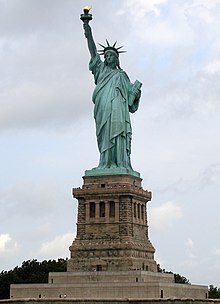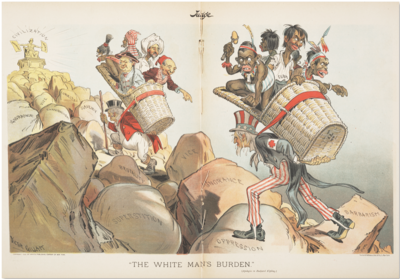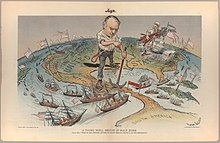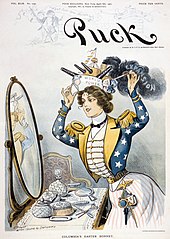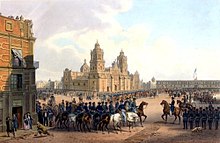German professor Sieglinde Lemke argues that the Statue of Liberty "signifies this proselytizing mission as the natural extension of the US' sense of itself as an exceptional nation."
American exceptionalism is one of three related ideas. The first is that the history of the United States is inherently different from other nations. In this view, American exceptionalism stems from its emergence from the American Revolution, thereby becoming what political scientist Seymour Martin Lipset called "the first new nation" and developing a uniquely American ideology, "Americanism", based on liberty, egalitarianism, individualism, republicanism, democracy and laissez-faire economics. This ideology itself is often referred to as "American exceptionalism." Second is the idea that the US has a unique mission to transform the world. As Abraham Lincoln stated in the Gettysburg address
(1863), Americans have a duty to ensure, "government of the people, by
the people, for the people, shall not perish from the earth." Third is
the sense that the United States' history and mission give it a
superiority over other nations.
The theory of the exceptionalism of the U.S. has developed over time and can be traced to many sources. French political scientist and historian Alexis de Tocqueville was the first writer to describe the country as "exceptional" in 1831 and 1840. The actual phrase "American Exceptionalism" was originally coined by Soviet leader Joseph Stalin as a critique of a revisionist
faction of American Communists who argued that the American political
climate was unique, making it an 'exception' to certain elements of Marxist theory. U.S. President Ronald Reagan is often credited with having crystallized this ideology in recent decades.
Political scientist Eldon Eisenach argues in the twenty-first century
American exceptionalism has come under attack from the postmodern left
as a reactionary myth: "The absence of a shared purposes ratified in the
larger sphere of liberal-progressive public policy....beginning with
the assumption of American exceptionalism as a reactionary myth."
Terminology
The exact term "American exceptionalism" was occasionally used in the 19th century. In his The Yale Book of Quotations, Fred Shapiro notes "exceptionalism" was used to refer to the United States and its self-image by The Times of London on August 20, 1861. Its common use dates from Communist usage in the late 1920s. Soviet leader Joseph Stalin chastised members of the Jay Lovestone-led faction of the American Communist Party
for its claim the U.S. was independent of the Marxist laws of history
"thanks to its natural resources, industrial capacity, and absence of
rigid class distinctions". Stalin may have been told of the usage
"American exceptionalism" by Broder & Zack in Daily Worker
(N.Y.) on January 29, 1929, before Lovestone's visit to Moscow. American
Communists started using the English term "American exceptionalism" in
factional fights. It then moved into general use among intellectuals.
In 1989, Scottish political scientist Richard Rose noted most American
historians endorse exceptionalism. He suggests these historians reason
as follows:
America marches to a different drummer. Its uniqueness is explained by any or all of a variety of reasons: history, size, geography, political institutions, and culture. Explanations of the growth of government in Europe are not expected to fit American experience, and vice versa.
However, postnationalist
scholars have rejected American exceptionalism, arguing the U.S. did
not break from European history, and accordingly, the U.S. has retained
class-based and race-based differences, as well as imperialism and willingness to wage war.
In recent years scholars from numerous disciplines, as well as
politicians and commentators in the traditional media, have debated the
meaning and usefulness of the concept. Roberts and DiCuirci ask:
- Why has the myth of American exceptionalism, characterized by a belief in America's highly distinctive features or unusual trajectory based on the abundance of its natural resources, its revolutionary origins and its Protestant religious culture that anticipated God's blessing of the nation, held such tremendous staying power, from its influence in popular culture to its critical role in foreign policy?
Some historians support the concept of American exceptionalism but
avoid the terminology, thereby avoid entangling themselves in rhetorical
debates. Bernard Bailyn,
a leading colonial specialist at Harvard, is a believer in the
distinctiveness of American civilization. Although he rarely, if ever,
uses the phrase "American exceptionalism," he insists upon the
"distinctive characteristics of British North American life." He has
argued the process of social and cultural transmission result in
peculiarly American patterns of education (in the broadest sense of the
word); and he believes in the unique character of the American
Revolution.
Origin of the term
Although the concept of American exceptionalism dates to the founding ideas, the term was first used in the 1920s.
Some claim the phrase "American exceptionalism" originated with the American Communist Party in an English translation of a condemnation made in 1929 by Soviet leader Joseph Stalin criticizing Communist supporters of Jay Lovestone
for the heretical belief the US was independent of the Marxist laws of
history "thanks to its natural resources, industrial capacity, and
absence of rigid class distinctions".
This origin has been challenged, however, because the expression
"American exceptionalism" was already used by Brouder & Zack in the Daily Worker (N.Y.) on January 29, 1929, before Lovestone's visit to Moscow. Also, Fred Shapiro, editor of The Yale Book of Quotations, has noted "exceptionalism" was used to refer to the United States and its self-image during the Civil War by The New York Times on August 20, 1861.
Early examples of the term's usage do include a declaration made
at the 1930 American Communist convention proclaiming "the storm of the
economic crisis in the United States blew down the house of cards of
American exceptionalism".
The phrase fell to obscurity after the 1930s, and in the 1980s
American newspapers popularized it to describe America's cultural and
political uniqueness. The phrase became an issue of contention between presidential candidates Barack Obama and John McCain in the 2008 presidential campaign, with Republicans attacking Obama for not believing in the concept.
History of the concept
Alexis de Tocqueville and others, from 1835
The first reference to the concept by name, and possibly its origin, was by French writer Alexis de Tocqueville in his 1835/1840 work, Democracy in America:
The position of the Americans is therefore quite exceptional, and it may be believed that no democratic people will ever be placed in a similar one. Their strictly Puritanical origin, their exclusively commercial habits, even the country they inhabit, which seems to divert their minds from the pursuit of science, literature, and the arts, the proximity of Europe, which allows them to neglect these pursuits without relapsing into barbarism, a thousand special causes, of which I have only been able to point out the most important, have singularly concurred to fix the mind of the American upon purely practical objects. His passions, his wants, his education, and everything about him seem to unite in drawing the native of the United States earthward; his religion alone bids him turn, from time to time, a transient and distracted glance to heaven. Let us cease, then, to view all democratic nations under the example of the American people.
Kammen says many foreign visitors commented on American exceptionalism including Karl Marx, Francis Lieber, Hermann Eduard von Holst, James Bryce, H. G. Wells, G. K. Chesterton, and Hilaire Belloc; they did so in complimentary terms. The theme became common, especially in textbooks. From the 1840s to the late 19th century, the McGuffey Readers sold 120 million copies and were studied by most American students. Skrabec (2009) argues the Readers "hailed American exceptionalism, manifest destiny,
and America as God's country... Furthermore, McGuffey saw America as
having a future mission to bring liberty and democracy to the world."
Communist debate, 1927
In June 1927 Jay Lovestone, a leader of the Communist Party in America
and soon to be named General Secretary, described America's economic
and social uniqueness. He noted the increasing strength of American
capitalism, and the country's "tremendous reserve power"; strength and
power which he said prevented Communist revolution. In 1929, the Soviet leader Joseph Stalin, disagreeing America was so resistant to revolution, called Lovestone's ideas "the heresy of American exceptionalism"—the first time the specific term "American exceptionalism" was used. The Great Depression appeared to underscore Stalin's argument American capitalism falls under the general laws of Marxism. In June 1930, during the national convention of the Communist Party USA
in New York, it was declared "The storm of the economic crisis in the
United States blew down the house of cards of American exceptionalism
and the whole system of opportunistic theories and illusions that had
been built upon American capitalist 'prosperity'".
Uniqueness
In
general, Americans have had consideration in national "uniqueness."
Historian Dorothy Ross points to three different currents regarding
unique characteristics.
- Some Protestants believed American progress would facilitate the return of Jesus Christ and Christian Millennium.
- Some 19th century historians linked American liberty to the development of liberty in Anglo-Saxon England.
- Other American writers looked to the "millennial newness" of America. Henry Nash Smith stressed the theme of "virgin land" in the American frontier that promised an escape from the decay that befell earlier republics.
21st-century development
Recently, socialists and other writers tried to discover or describe this exceptionalism of the U.S. within and outside its borders.
The concept has also been discussed in the context of the 21st century in a book co-authored by former American Vice President Dick Cheney: Exceptional: Why the World Needs a Powerful America (2015).
Causes in their historical context
Scholars have explored possible justifications for the notion of American exceptionalism.
Absence of feudalism
Many scholars use a model of American exceptionalism developed by Harvard political scientist Louis Hartz. In The Liberal Tradition in America
(1955), Hartz argued that the American political tradition lacks the
left-wing/socialist and right-wing/aristocratic elements that dominated
in most other lands because colonial America lacked any feudal
traditions, such as established churches, landed estates and a
hereditary nobility. The "liberal consensus" school, typified by David Potter, Daniel Boorstin and Richard Hofstadter
followed Hartz in emphasizing that political conflicts in American
history remained within the tight boundaries of a liberal consensus
regarding private property, individual rights, and representative government. The national government that emerged was far less centralized or nationalized than its European counterparts.
Puritan roots and Protestant promise
Parts of American exceptionalism can be traced to American Puritan roots. Many Puritans with Arminian leanings embraced a middle ground between strict Calvinist predestination and a less restricting theology of Divine Providence.
They believed God had made a covenant with their people and had chosen
them to provide a model for the other nations of the Earth. One Puritan
leader, John Winthrop, metaphorically expressed this idea as a "City upon a Hill"—that the Puritan community of New England should serve as a model community for the rest of the world. This metaphor is often used by proponents of exceptionalism. The Puritans' moralistic values remained part of the national identity of the United States for centuries, remaining influential to the present day.
In this vein, Max Weber was a pioneer in delineating a connection
between capitalism and exceptionalism. Eric Luis Uhlmann of
Northwestern University argues that Puritan values were taken up by all
remaining Americans as time went by. Kevin M. Schultz underlines how they helped America to keep to its Protestant Promise, especially Catholics and Jews.
American Revolution and republicanism
The ideas that created the American Revolution were derived from a tradition of republicanism that had been repudiated by the British mainstream. Historian Gordon Wood
has argued, "Our beliefs in liberty, equality, constitutionalism, and
the well-being of ordinary people came out of the Revolutionary era. So
too did our idea that we Americans are a special people with a special
destiny to lead the world toward liberty and democracy." Wood notes that the term is "presently much-maligned," although it is vigorously supported by others such as Jon Butler.
Thomas Paine's Common Sense
for the first time expressed the belief that America was not just an
extension of Europe but a new land, a country of nearly unlimited
potential and opportunity that had outgrown the British mother country.
These sentiments laid the intellectual foundations for the Revolutionary
concept of American exceptionalism and were closely tied to republicanism, the belief that sovereignty belonged to the people, not to a hereditary ruling class.
Religious freedom characterized the American Revolution in unique ways—at a time when major nations had state religions. Republicanism (led by Thomas Jefferson and James Madison) created modern constitutional republicanism,
with a limit on ecclesiastical powers. Historian Thomas Kidd (2010)
argues, "With the onset of the revolutionary crisis, a significant
conceptual shift convinced Americans across the theological spectrum
that God was raising up America for some particular purpose."
Kidd further argues that "a new blend of Christian and republican
ideology led religious traditionalists to embrace wholesale the concept
of republican virtue".
Jefferson and the Empire of Liberty
According
to Tucker and Hendrickson (1992), Jefferson believed America "was the
bearer of a new diplomacy, founded on the confidence of a free and
virtuous people, that would secure ends based on the natural and
universal rights of man, by means that escaped war and its corruptions".
Jefferson sought a radical break from the traditional European emphasis
on "reason of state" (which could justify any action) and the usual
priority of foreign policy and the needs of the ruling family over the
needs of the people.
Jefferson envisaged America is becoming the world's great "Empire of Liberty"—that
is, the model for democracy and republicanism. He identified his nation
as a beacon to the world, for, he said on departing the presidency in
1809, America was: "Trusted with the destinies of this solitary republic
of the world, the only monument of human rights, and the sole
depository of the sacred fire of freedom and self-government, from hence
it is to be lighted up in other regions of the earth, if other areas of
the earth shall ever become susceptible of its benign influence."
Basis of arguments
Marilyn B. Young
argues that after the end of the Cold War in 1991, neoconservative
intellectuals and policymakers embraced the idea of an "American
empire," a national mission to establish freedom and democracy in other
nations, particularly poor ones. She argues that after the September
11th, 2001 terrorist attacks, the George W. Bush administration
reoriented foreign policy to an insistence on maintaining the supreme
military and economic power of America, an attitude that harmonized with
this new vision of American empire. Young says the Iraq War (2003–2011)
exemplified American exceptionalism.
In 2012, conservative historians Larry Schweikart and Dave Dougherty argued that American Exceptionalism be based on four pillars: (1) Common Law;
(2) Virtue and morality located in Protestant Christianity; (3)
Free-market capitalism; and (4) the sanctity of private property.
In a 2015 book entitled Exceptional: Why the World Needs a Powerful America, former U.S. Vice President Dick Cheney sets out and argues the case for American Exceptionalism, and concludes: "we are, as Lincoln
said, 'the last, best hope of earth.' We are not just one more nation,
one more same entity on the world stage. We have been essential to the
preservation and progress of freedom, and those who lead us in the years
ahead must remind us, as Roosevelt, Kennedy, and Reagan did, of the unique role we play. Neither they nor we should ever forget that we are, in fact, exceptional."
Republican ethos and ideas about nationhood
Proponents of American exceptionalism argue that the United States be exceptional in that it was founded on a set of republican ideals, rather than on a common heritage, ethnicity, or ruling elite. In the formulation of President Abraham Lincoln in his Gettysburg Address,
America is a nation "conceived in liberty, and dedicated to the
proposition that all men are created equal". In Lincoln's
interpretation, America is inextricably connected with freedom and
equality, and in world perspective, the American mission is to ensure,
"that government of the people, by the people, for the people, shall not
perish from the earth." Historian T. Harry Williams argues that Lincoln believed:
- In the United States man would create a society that would be the best and the happiest in the world. The United States was the supreme demonstration of democracy. However, the Union did not exist just to make men free in America. It had an even greater mission—to make them free everywhere. By the mere force of its example, America would bring democracy to an undemocratic world.
American policies have been characterized since their inception by a
system of federalism (between the states and the federal government) and
checks and balances
(among the legislative, executive and judicial branches), which were
designed to prevent any faction, region, or government organ from
becoming too powerful. Some proponents of the theory of American
exceptionalism argue that this system and the accompanying distrust of
concentrated power prevent the United States from suffering a "tyranny of the majority",
are preservative of a free republican democracy, and also that it
allows citizens to live in a locality whose laws reflect those voters'
values. A consequence of this political system is that laws can vary
widely across the country. Critics of American exceptionalism maintain
that this system merely replaces the power of the national majority over
states with power by the states over local entities. On balance, the
American political system arguably allows for more local dominance but
prevents more domestic dominance than does a more unitary system.
Historian Eric Foner has explored the question of birthright citizenship, the provision of the Fourteenth Amendment (1868) that makes every baby born in the United States a full citizen.
He argues that
- birthright citizenship stands as an example of the much-abused idea of American exceptionalism... birthright citizenship does make the United States (along with Canada) unique in the developed world. No European nation recognizes the principle.
Global leadership and activism
Yale Law School Dean Harold Hongju Koh
has identified what he says is "the most important respect in which the
United States has been genuinely exceptional, about international
affairs, international law, and promotion of human rights: namely, in
its outstanding global leadership and activism." He argues:
To this day, the United States remains the only superpower capable, and at times willing, to commit real resources and make real sacrifices to build, sustain, and drive an international system committed to international law, democracy, and the promotion of human rights. Experience teaches that when the United States leads on human rights, from Nuremberg to Kosovo, other countries follow.
Peggy Noonan, an American political pundit, wrote in The Wall Street Journal
that "America is not exceptional because it has long attempted to be a
force for good in the world, it tries to be a force for good because it
is exceptional".
Former U.S. Vice President Dick Cheney explores the concept of United States global leadership in a 2015 book on American foreign policy entitled Exceptional: Why the World Needs a Powerful America, co-authored with his daughter, Liz Cheney, a former official of the United States Department of State.
Frontier spirit
Proponents
of American exceptionalism often claim that many features of the
"American spirit" were shaped by the frontier process (following Frederick Jackson Turner's Frontier Thesis).
They argue the American frontier allowed individualism to flourish as
pioneers adopted democracy and equality and shed centuries-old European
institutions such as royalty, standing armies, established churches and a
landed aristocracy that owned most of the land.
However, this frontier experience was not entirely unique to the United
States. Other nations had frontiers, but it did not shape them nearly
as much as the American frontier did, usually because it was under the
control of a strong national government. South Africa, Russia, Brazil,
Argentina, Canada and Australia had long frontiers, but they did not
have "free land" and local control.
The political and cultural environments were much different—the other
frontiers did not involve widespread ownership of free land nor allow
the settlers to control the local and provincial governments as in
America. Their edge did not shape their national psyches. Each nation had entirely different frontier experiences. For example, the Dutch Boers
in South Africa were defeated in war by Britain. In Australia,
"mateship" and working together was valued more than individualism was
in the United States.
Mobility and welfare
For most of its history, especially from the mid-19th to early 20th
centuries, the United States has been known as the "land of
opportunity", and in this sense, it prided and promoted itself on
providing individuals with the opportunity to escape from the contexts
of their class and family background. Examples of this social mobility include:
- Occupational—children could easily choose careers which were not based upon their parents' choices.
- Physical—that geographical location was not seen as static, and citizens often relocated freely over long distances without barrier.
- Status—as in most countries, family standing and riches were often a means to remain in a higher social circle. America was notably unusual due to an accepted wisdom that anyone—from poor immigrants upwards—who worked hard, could aspire to similar standing, regardless of circumstances of birth. This aspiration is commonly called living the American dream. Birth details were not taken as a social barrier to the upper echelons or high political status in American culture. This stood in contrast to other countries where many larger offices were socially determined, and usually hard to enter without being born into the suitable social group.
However, social mobility in the U.S. is lower than in some European Union
countries if defined regarding income movements. American men born into
the lowest income quintile are much more likely to stay there compared
to similar people in the Nordic countries or the United Kingdom. Many economists, such as Harvard economist N. Gregory Mankiw,
however, state that the discrepancy has little to do with class
rigidity; rather, it is a reflection of income disparity: "Moving up and
down a short ladder is a lot easier than moving up and down a tall
one."
Regarding public welfare, Richard Rose
asked in 1989 whether the evidence shows whether the U.S. "is becoming
more like other mixed-economy welfare states, or increasingly
exceptional." He concludes, "By comparison with other advanced
industrial nations America is today exceptional in total public
expenditure, in major program priorities, and in the value of public
benefits."
Criticism
Scholars have been polarized on the topic, according to Michael Kammen
with historians generally against it, while empirical social scientists
have tended to be supporters. Kammen reports that historians Lawrence
Veysey, C. Vann Woodward, Eric Foner, Sean Wilentz, Akira Iriye, and Ian Tyrrell have been opponents, while support has come from social scientists Daniel Bell, Seymour Martin Lipset, Alex Inkeles, Sanford Jacoby, Samuel P. Huntington, Mona Harrington, John P. Roche, Richard Rose, Peter Temin, and Aaron Wildavsky.
Kammen argues that the hostile attacks began in the 1970s in the
wake of the Vietnam War, when many intellectuals decided, "The American
Adam had lost his innocence and given way to a helpless, tarnished
Gulliver." At about the same time, the new social history
used statistical techniques on population samples that seemed to show
resemblances with Europe on issues such as social mobility. By the
1980s, labor historians were emphasizing that the failure of a work
party to emerge in the United States did not mean that America was
exceptionally favorable grounds for workers. By the late 1980s, other
academic critics started mocking the extreme chauvinism displayed by the
modern usage of exceptionalism. Finally mid-1980s, colonial historians
downplayed the uniqueness of the American experience in the context of
British history.
On the other hand, some of the critics pulled their punches, with
Wilentz arguing for "distinctively American forms of class conflict" and
Foner saying there was a "distinctive character of American trade
unionism."
The third idea of American exceptionalism—superiority—has been
attacked with charges of moral defectiveness and the existence of double
standards. In American Exceptionalism and Human Rights (2005), Canadian commentator Michael Ignatieff
couches his discussion of the topic in entirely pejorative terms. He
identifies three main sub-types: "exemptionalism" (supporting treaties
as long as U.S. citizens are exempt from them); "double standards"
(criticizing "others for not heeding the findings of international human
rights bodies, but ignoring what these organizations say of the United
States"); and "legal isolationism" (the tendency of U.S. judges to
ignore other jurisdictions).
Exceptionalism as "exemptionalism"
During the George W. Bush administration (2001–2009), the term was somewhat abstracted from its historical context.
Proponents and opponents alike began using it to describe a phenomenon
wherein certain political interests view the United States as being
"above" or an "exception" to the law, specifically the Law of Nations.
(This phenomenon is less concerned with justifying American uniqueness
than with asserting its immunity to international law.) This new use of
the term has served to confuse the topic and muddy the waters since its
unilateralist emphasis, and actual orientation diverges somewhat from
prior uses of the phrase. A certain number of those who subscribe to
"old-style" or "traditional American exceptionalism"-the idea that
America is a more nearly exceptional nation than are others, that it
differs qualitatively from the rest of the world and has a unique role
to play in world history—also agree that the United States is and ought
to be entirely subject to and bound by the public international law.
Indeed, recent research shows that "there is some indication for
American exceptionalism among the [U.S.] public, but very little
evidence of unilateral attitudes".
On September 12, 2013, in the context of U.S. President Barack
Obama's comment about American exceptionalism during his September 10,
2013, talk to the American people while considering military action on Syria for its alleged use of chemical weapons against civilians, Russian President Vladimir Putin
criticized Obama saying that "It is extremely dangerous to encourage
people to see themselves as exceptional, whatever the motivation."
In his interview with RT on October 4, 2013, President of Ecuador Rafael Correa criticized Obama's policies and compared America's exceptionalism with Nazi Germany,
saying: "Does not this remind you of the Nazis' rhetoric before and
during World War II? They considered themselves the chosen race, the
superior race, etc. Such words and ideas pose extreme danger."
Moral purity
Critics on the left such as Marilyn Young and Howard Zinn have argued that American history is so morally flawed, citing slavery, civil rights and social welfare issues, that it cannot be an exemplar of virtue.
Zinn argues that American exceptionalism cannot be of divine origin
because it was not benign, especially when dealing with Native
Americans.
Donald E. Pease mocks American exceptionalism as a "state fantasy" and a "myth" in his 2009 book The New American Exceptionalism.
Pease notes that "state fantasies cannot altogether conceal the
inconsistencies they mask", showing how such events as the revelations
of prisoner abuse at Abu Ghraib prison and the exposure of government incompetence after Hurricane Katrina "opened fissures in the myth of exceptionalism".
American theologian Reinhold Niebuhr
argued that the automatic assumption that America acts for the right
will bring about moral corruption. However, Niebuhr did support the
nation's Cold War policies. His position (called "Christian realism") advocated a liberal notion of responsibility that justified interference in other nations.
Double standards
U.S.
historians like Thomas Bender "try and put an end to the recent revival
of American exceptionalism, a defect he esteems to be inherited from
the Cold War". Gary W. Reichard and Ted Dickson argue "how the development of the United States has always depended on its transactions with other nations for commodities, cultural values and populations". Roger Cohen
asks, "How exceptional can you be when every major problem you face,
from terrorism to nuclear proliferation to gas prices, requires joint
action?" Harold Koh distinguishes "distinctive rights, different labels, the 'flying buttress' mentality, and double standards. (…) [T]he fourth face—double standards—presents the most dangerous and destructive form of American exceptionalism." Godfrey Hodgson also concludes that "the US national myth is dangerous". Samantha Power
asserts that "we're neither the shining example, nor even competent
meddlers. It's going to take a generation or so to reclaim American
exceptionalism."
Americanist heresy
In 1898 Pope Leo XIII denounced what he deemed to be the heresy of Americanism in the encyclical Testem benevolentiae nostrae.
He targeted American exceptionalism in the ecclesiastical domain,
arguing that it stood in opposition to Papal denunciations of
modernism.
At the end of the 19th century, there was a tendency among Catholic
clergy in the United States to view American society as inherently
different from other Christian nations, and to argue that the
understanding of Church doctrine had to be enlarged in order to
encompass the 'American Experience', which included greater
individualism, tolerance of other religions, and Church–State
separation.
Pre-emptive declinism
Herbert London has defined pre-emptive declinism
as a postmodern belief "that the United States is not an exceptional
nation and is not entitled by virtue of history to play a role on the
world stage different from other nations". London ascribed the view to Paul Krugman, among others. Krugman had written in The New York Times
that "We have always known that America's reign as the world's greatest
nation would eventually end. However, most of us imagined that our
downfall, when it came, would be something grand and tragic."
According to RealClearPolitics, declarations of America's declining power have been common in the English-language media. In 1988, Flora Lewis
said that "Talk of U.S. decline is real in the sense that the U.S. can
no longer pull all the levers of command or pay all the bills."
According to Anthony Lewis
in 1990, Europeans and Asians are already finding confirmation of their
suspicion that the United States is in decline. Citing America's
dependence on foreign sources of energy and "crucial weaknesses" in the
military, Tom Wicker concluded "that maintaining superpower status is becoming more difficult—nearly impossible—for the United States". In 2004, Pat Buchanan lamented "the decline and fall of the greatest industrial republic the world had ever seen". In 2007, Matthew Parris of The Sunday Times
in London wrote that the United States is "overstretched", romantically
recalling the Kennedy presidency, when "America had the best arguments"
and could use moral persuasion rather than force to have its way in the world. From his vantage point in Shanghai, the International Herald Tribune's Howard French worries about "the declining moral influence of the United States" over an emergent China.
In his book, The Post-American World, Newsweek editor Fareed Zakaria
refers to a "Post-American world" that he says "is not about the
decline of America, but rather about the rise of everyone else".
Similarities between the U.S. and Europe
In December 2009, historian Peter Baldwin published a book arguing that, despite widespread attempts to contrast the 'American way of life' and the 'European social model',
America and Europe are actually very similar to a number of social and
economic indices. Baldwin claimed that the black underclass accounts for
many of those few areas where a stark difference exists between the
U.S. and Europe, such as homicide and child poverty.
The historian Felipe Fernández-Armesto
argues that it be commonly thought that all people consider themselves
exceptional. In most cases in which this subject has been broached the
similarities between the conflicting parties outweigh the differences.
Things such as the "dynamic wealth creation, the democracy, the
accessibility of opportunity, the cult of civil liberty, the tradition
of tolerance," and what Fernández-Armesto considers evils such as the
materialistic economy, the excessive privileges of wealth, and the
selective illiberality are standard features in many modern societies.
However, he adds, America is made exceptional by the intensity with
which these characteristics are concentrated there.
Current official stance and its detractors
In April 2009, U.S. President Barack Obama
responded to a journalist's question in Strasbourg with the statement,
"I believe in American exceptionalism, just as I suspect that the Brits
believe in British exceptionalism and the Greeks believe in Greek
exceptionalism."
Obama further noted that "I see no contradiction between believing that
America has a continued extraordinary role in leading the world towards
peace and prosperity and recognizing that leadership is incumbent,
depends on, our ability to create partnerships because we create
partnerships because we can't solve these problems alone." Mitt Romney attacked Obama's statement, arguing it showed Obama did not believe in American exceptionalism. Former Arkansas Governor Mike Huckabee
said that Obama's "worldview is dramatically different from any
president, Republican or Democrat, we've had... He grew up more as a
globalist than an American. To deny American exceptionalism is in
essence to deny the heart and soul of this nation."
In a speech on the Syria crisis
on September 10, 2013, Obama said: "however, when, with modest effort
and risk, we can stop children from being gassed to death, and thereby
make our kids safer over the long run, I believe we should act... That
is what makes America different. That is what makes us exceptional." In a direct response the next day, Russian President Vladimir Putin published an op-ed in The New York Times,
articulating that "It is extremely dangerous to encourage people to see
themselves as exceptional, whatever the motivation... We are all
different, but when we ask for the Lord's blessings, we must not forget
that God created us equal." Putin's views were soon endorsed by future president Donald Trump
who declared the op-ed "a masterpiece": "You think of the term as being
beautiful, but all of sudden you say, what if you're in Germany or
Japan or any one of 100 different countries? You are not going to like
that term," Trump said. "It is very insulting, and Putin put it to him
about that." Some left-wing American commentators agree with Trump's stance; one example is Sherle Schwenninger, a co-founder of the New America Foundation, who in a 2016 Nation
magazine symposium remarked that "Trump would redefine American
exceptionalism by bringing an end to the neoliberal/neoconservative
globalist project that Hillary Clinton and many Republicans support". However, Trump has also advocated an "America First" policy, emphasizing American nationalism and unilateralism.
